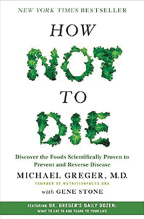
Title: How Not to Die: Discover the Foods Scientifically Proven to Prevent and Reverse Disease
Author: Michael Greger, MD, with Gene Stone
Publisher: Flatiron Books
Publication date: December 2015
Price: $27.99; hardcover, 576 pages
Longevity is a common goal among humans. And like all things human, it is not distributed equally. According to world health data, Japan is number one on the longevity list; its 130 million citizens have a life expectancy of about 84.74 years. The sub-Saharan country of Chad is number 224, having the shortest life span in the world, at 49.81 years. The United States ranks 43, we live on average 79.68 years. It’s worth noting that Canada, with its much-maligned health-care system, ranks number 18—about 2 years longer than that in the United States.
Of course, there are many socioeconomic, environmental, political, genetic, life-style, and demographic reasons for the disparity in longevity between Japan and Chad. According to Michael Greger, MD, there are a lot of ways for your life expectancy to be more like that in Japan and less like that in Chad, and he’s carefully described them in his new book, How Not to Die: Discover the Foods Scientifically Proven to Prevent and Reverse Disease, written with Gene Stone, author of The New York Times bestseller Forks Over Knives: The Plant-Based Way to Health.
Prevention Through Diet
In his introduction, Dr. Greger writes, “Most deaths in the United States are preventable, and they are related to what we eat. Our diet is the number-one cause of premature death…. Surely diet must also be the number-one thing taught in medical schools, right? Sadly it’s not.”
Like many health zealots, Dr. Greger shoots himself in the foot with an outlandish proposition that diet should be the number-one thing taught in medical schools. Yes, there probably should be more effort put into teaching prevention through diet, but doctors are trained to treat sick people; they are not public health advocates, policymakers, or dieticians.
Making a sea change in American eating habits requires a concerted effort similar to the War on Tobacco, which radically reduced the rate of smoking. However, careful readers, especially those who know the work it takes to produce high-quality doctors, will bristle at knee-jerk statements like this one. Unfortunately, the book is replete with them.
Selecting Chapters of Interest
How Not to Die is divided into two sections: How and Why. The chapters in the How section include monotonous titles such as “How Not to Die From Heart Disease, Diabetes, Infection, Digestive Cancer.” The Why section chapters include titles such as “Beans, Berries, Cruciferous Vegetables.” This is a big book, with about 160 pages of endnotes alone.
The good thing about the book’s structure is that it allows the reader to pick and chose chapters of interest. Section Two is the stronger of the sections, as it gives a plethora of interesting information about food. Here the author also does an admirable job in consumer education, giving the reader insights into food marketing. And he uses smart-looking call-out boxes—a great visual aid in a book like this—to drive home the salient points of each chapter.
Plants Are King
Dr. Greger ends his book with a quote from the famous pediatrician Dr. Benjamin Spock: “Children who grow up getting their nutrition from plant foods have a tremendous health advantage and are much less likely to develop health problems as the years go by.” And that pretty much sums up this book’s central message. If you have a predominantly plant-based diet, you will live longer and have a better quality of life. And to his credit, he does a good job making that case.
Our diet is the number-one cause of premature death…. Surely diet must also be the number-one thing taught in medical schools, right? Sadly it’s not.— Michael Greger, MD
Tweet this quote
However, nothing can redo the crippling effects of Section One, during which he lectures the reader on how not to die from a variety of illnesses including suicidal depression. Some readers might be impressed by the bulk of references and endnotes, but in science, size does not trump evidence. For example, in the chapter “How Not to Die of Iatrogenic Causes,” he begins riffing on the benefits and harms of aspirin. He delves into some analysis showing potential anticancer benefits of aspirin, including this whopper: “Given that low-dose aspirin may reduce the risk of cancer mortality by one-third, it is tempting to recommend it for everyone.”
Although there is a lot of very usable information in this book for those readers who have the patience to cull the solid from the supposition, How Not to Die is not recommended for readers of The ASCO Post. ■

